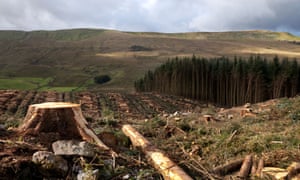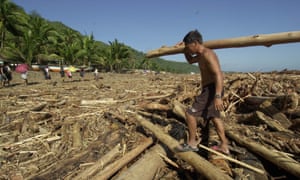“This Company Wants to Convert Used Clothing Into Fuel”

Recycler Jeplan is working to extract cotton fiber from used apparel and convert it to fuel. Jeplan says 1 ton of junked clothing can generate about 700 liters of ethanol, sparing land and water resources that could be used to grow food. The company says it’s also developed a way to recycle polyester. That compound is blended into many fabrics to reduce costs, improve durability, and make outfits wrinkle-resistant. It’s used in about 60 percent of the clothing produced worldwide each year, according to Jeplan, and can be a valuable resource when broken down and reused in new clothing.
“We may be closer than we thought to dangerous climate thresholds”

A new study identifies an extra 0.1°C of human-caused warming. It turns out that 2015 was the first year on record that passed the 1°C (1.8°F) mark. It means that 2016 was approximately 0.1°C (0.2°F) warmer than we had thought relative to the pre-industrial time period. To put this in perspective, it is almost an extra decade of warming.
“Only 25 Hainan Gibbons Remain – What Next For The World’s Rarest Primate?”

Not only is the Hainan gibbon (or Nomascus hainanus) the world’s rarest ape and rarest primate, it’s one of the rarest mammals of all. The entire species now consists of a single population of around 25 individuals, which separates into smaller social groups. The animals are restricted to just two square kilometres of remnant rainforest in Bawangling National Nature Reserve on Hainan Island in the South China Sea.
“Scientists Warn Trump’s Border Wall Will Be Bad for the Planet”

President Donald Trump’s plan for a southern border wall will cost billions of dollars and has already sparked a diplomatic rift with Mexico. It’s also going to be bad for the planet.
A 1,000-mile (1,600-kilometer) wall would require an estimated 275 million cubic feet of concrete. It would release as much as 1.9 million metric tons of carbon dioxide into the atmosphere, according to Christoph Meinrenken, an associate research scientist at Columbia University’s Earth Institute. That’s more than the annual emissions from every home in Pittsburgh.
“Guess Which Way the Doomsday Clock Just Ticked”

https://www.bloomberg.com/news/articles/2017-01-26/guess-which-way-the-doomsday-clock-just-ticked
A group of scientists warn that human civilization is nearer destruction than at any time since 1953. Amid nuclear proliferation, American leadership that dismisses climate change—and in a nod to the 2016 U.S. presidential election—the risk of fake news sparking a crisis, the end is apparently a lot closer than it used to be.
Putting aside the risk of sudden global annihilation, the scientists see a slower doom that may also befall us. Last year was the warmest on record, while 16 of the planet’s 17 hottest years on record have come to pass since 2001. With an allusion to one Trump aide’s term for falsehoods about inaugural attendance, CIA relations, and voting fraud, David Titley, a climate science expert from Pennsylvania State University and bulletin member, said “alternative facts will not make the challenge of climate change magically go away.”
“Second winner of environmental prize killed months after Berta Cáceres death”

An indigenous Mexican activist who received the prestigious Goldman environmental prize for his crusade against illegal logging has been shot dead, the second award-winner to have been murdered in less than 12 months.
“London’s Mayor Issues First ‘Very High’ Air Pollution Alert”

Sadiq Khan issued the first “very high” air pollution alert of his eight-month tenure as London mayor, advising citizens to reduce physical exertion and avoid running outside.
“The tip of the iceberg: the implications of climate change on financial markets”

The tip of the iceberg: the implications of climate change on financial markets
There has been a recent increase in awareness of investors that limiting emissions to prevent climate change might leave a substantial proportion of the world’s carbon reserves unusable, and that this could lead to revaluations across a range of financial assets. If risks are left unaddressed, this could result in large losses for some investors. But is this adjustment in financial market prices likely to be abrupt? And – even if it is – is it likely to pose risks to financial stability? We argue that the answer to both these questions could be yes: financial valuations can move sharply even if the transition to sustainable energy were smooth. And exposures are sufficiently large to warrant attention from both investors and policymakers.
“Over half of world’s wild primate species face extinction, report reveals”

More than half of the world’s apes, monkeys, lemurs and lorises are now threatened with extinction as agriculture and industrial activities destroy forest habitats and the animals’ populations are hit by hunting and trade.
“Does climate change cause conflict?”

https://www.brookings.edu/blog/africa-in-focus/2017/01/20/does-climate-change-cause-conflict/
A research paper, “Warming increases the risk of civil war in Africa,” presented to the U.S. National Academy of Sciences claims that temperature rises in Africa have coincided with significant increases in the likelihood of war.
Recent Comments